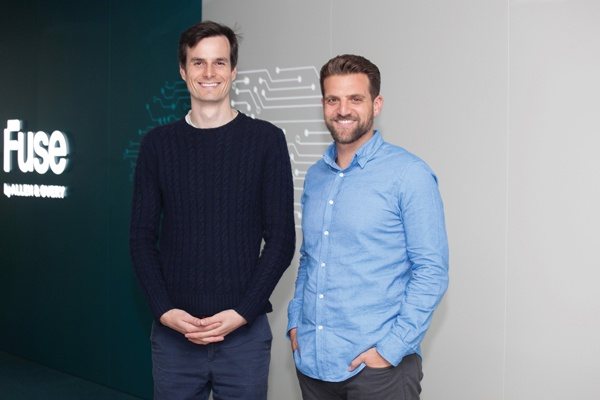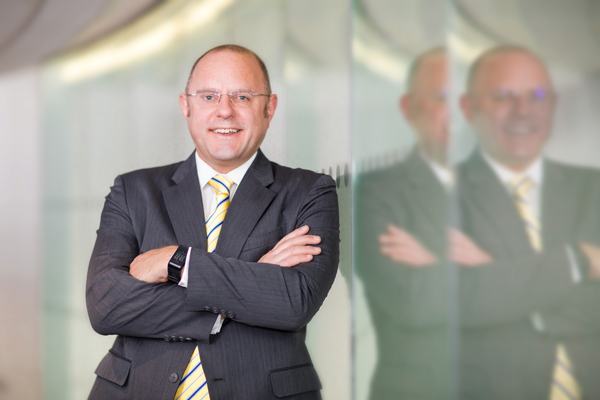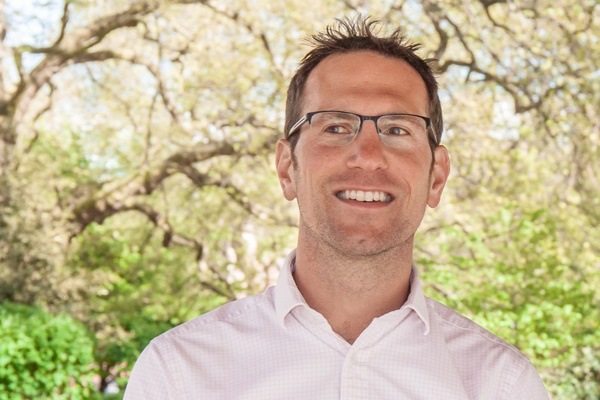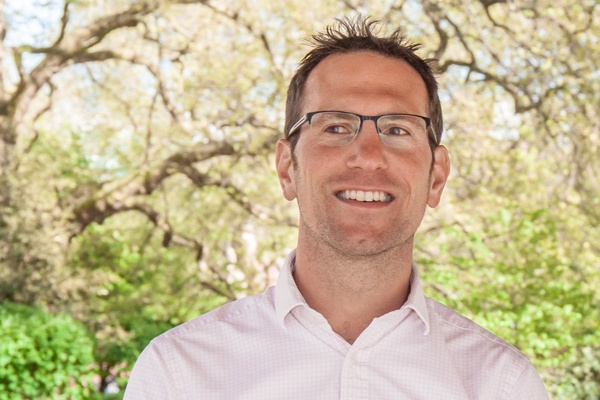In a quiet east London street off the bustling Brick Lane, a few doors from a sign tagged ‘Vegan Hair Salon’ is a co-working space. You meet Gaz, the office’s bulldog, and work among Star Wars figurines, gaming consoles and an electric drum kit.
It has blackboard walls and is suspiciously empty on a Friday afternoon given the barbecue outside. Equidistant from the corporate hub at Liverpool Street and the ‘scene’ of Shoreditch High Street, music plays.
The person The In-House Lawyer is interviewing, Legal Geek founder Jimmy Vestbirk, is a few minutes late cycling back from a meeting in Canary Wharf. His community is currently a key meeting place for the profession and the UK’s proliferating band of legal start-ups.
A background running dating websites may seem a strange grounding but Vestbirk reflects: ‘A lot of what we do is similar, we’re just bringing people together… for different reasons.’
With the obligatory ‘no ties’ rule and bringing a ‘gender neutral’ high-five to law, he notes: ‘We’re just trying to break that traditional hierarchy. The student is as likely to change the legal profession in the next five years as the managing partner.’
Experience of awkward meetings between strangers is a useful primer to get start-ups in bed with big law. What is probably more relevant is experience of seeing his previous business falter in the face of better, cheaper alternatives. Law firms only pontificate about disruption, Vestbirk has lived it.
Buzzwords permeate this world, but not much meaningful conversation. There have been a few dates between the conservative profession and youthful and individualistic start-ups, but a growing movement wants something deeper than a fleeting, unsatisfying hook-up.
One start-up founder, Juro’s Richard Mabey, captures the contradiction of bringing these two worlds together: ‘When you build software businesses, there are clichés thrown around, like “move fast and break shit” [referencing Facebook’s legendary original motto]. But in the legal sector we have to say “move fast and break shit, but don’t break shit”. This is a high-risk environment.’ So disruptive but in a surgical way. Kind of non-disruptive.
The In-House Lawyer investigated the confluence of start-ups and law firms dabbling in the sector. Can this culture clash live up to the California-tinged buzz?
Ex-lawyer meets technologist
The ‘legal tech’ label is only a few years old. But Lexoo, a legal Airbnb connecting lawyers and boutiques with small businesses and in-house teams, is a relative veteran. Chief executive Daniel van Binsbergen cut his teeth as a high school entrepreneur trading Humphrey the Camel during the Beanie Babies craze of the ‘90s. He went on to become a senior associate before founding Lexoo, when legal tech was just a subset of fintech (in truth, it still struggles to escape the gravity of its far larger financial counterpart). ‘Legal tech wasn’t a thing and that’s crazy because it was only four years ago.’
After Vestbirk’s £30-a-month desktop dating business was ‘disrupted’ he decamped to San Francisco to research his own law start-up, co-founding on-demand paralegal service F-Lex. Fintech was booming in London – the UK has by far the largest venture capital and legal markets in Europe – and he wanted the same for law. ‘I’ve been saying that for three years now to anyone who would listen.’
Legal Geek has evolved from 30 early movers consuming pizza and beer in a basement to a community with an annual conference attended by 1,000 people or ‘law-gends’ (a play on ‘legends’ – stick with us) and related projects.
Thomson Reuters and Legal Geek research last summer put investment into UK legal start-ups at £16m over the previous 18 months. Its start-up ‘map’, modelled on the London Underground and split into six different category ‘lines’, has more than 60 companies less than seven years old and generating less than £5m in funding or revenue.
About 190 want to be on the next map. Definitions vary for start-ups, making it hard to benchmark investment. But a Legalease analysis of Companies House records for UK-active start-ups shows investment is closer to £50m over the last four years, including more than £20m since July.
While The In-House Lawyer was researching this article, contract management provider Juro raised $2m, document collaboration specialist ClauseMatch raised $5m, and another start-up was closing a $3m round.
In June, the much-touted artificial intelligence company Eigen Technologies, which boasts Linklaters as an anchor client, secured a headline-grabbing £13m investment from Goldman Sachs and Temasek, Singapore’s sovereign wealth fund.
Juro’s Mabey notes: ‘There’s some figure going around there’s £16m of funding. If so, we’ve raised an eighth of that.’
Investment is one thing but cultural differences are the major challenge. Some sell to firms, some sell in-house, some to both. Others, like online will provider Farewill, target consumers. Despite lofty claims, many products are about removing grunt work or improving transparency and there are a lot of businesses tackling similar problems.

A good example is end-to-end deal platform Legatics. Founder Anthony Seale, a former City project lawyer, remembers compiling thousands of emails and data in a huge Microsoft Word table. His platform still looks like that table but is a live transaction space stripping out a lot of legwork. It has been used for about 50 deals on transactions worth billions.
‘Make it look like Microsoft Word and they’ll use it,’ advises Seale. He knows his audience.
Another is California’s Ping, founded by a former litigator who hated timekeeping. Ryan Alshak’s tech populates a lawyer’s timesheet automatically, covering everything from phone calls to desk time, although not yet time spent in the shower: a question he has had from several lawyers.
Nearly every start-up bemoans year-long sales cycles, a potential killer for firms relying on quick scale. But the chief difficulty is the legal industry’s aversion to risk.
Avvoka director Eliot Benzecrit, a former associate who had more than one ‘dentist appointment’ while working on his contract automation tool alongside his day-job, recalls one tender where Avvoka was unexpectedly competing against two incumbent tech providers. The market was taking them more seriously, but still asked for ‘comfort’ disclosures around its stability. One US company even wanted Avvoka’s code held in escrow.
Vestbirk says it is often easier for start-ups to get investment from a law firm than win them as a client. ‘That’s interesting. That doesn’t make sense.’
Quirky interactions between start-ups and law firms and corporations highlight this awkward marriage best, however.
Orbital Witness co-founder Edmond Boulle used Star Wars’ theme to present his company’s use of satellite tech in law. The first question was if he had legal permission: ‘I thought: “Yup, I’m in the right room.”’ One start-up’s terms and conditions were re-written entirely by a lawyer client. Avvoka’s Benzecrit says his chief technology officer (CTO) still has to be forced to wear an M&S suit to meet law firms: ‘We’ve got a meeting later, it’s [my co-founder’s] turn to hold the suit.’
For all the hopeful ex-lawyers and optimists, there is much re-badging of old concepts. A number of ‘start-ups’ started three or more years ago. There are also the legal industry’s serial entrepreneurs re-inventing wares to catch the start-up bandwagon.

While there is much talk of law firm ‘incubators’, most ventures are hybrids or closer to ‘accelerators’. Incubators are usually open-ended and work as looser mentorships, while accelerators are more structured, intense and focused on young companies refining a minimal viable product (MVP). Accelerators are also normally ‘cohort-based’ – meaning you apply to join a ‘class’. Further muddying the waters is the overlap between law tech and the larger fintech world. The partnering ventures announced in 2016 by both Slaughter and May and Addleshaw Goddard in fintech are sometimes about positioning their law practices with the next generation of finance clients rather than new tech. There is some crossover, most notably at Allen & Overy (A&O), and Slaughters is also gearing up to launch a dedicated law tech programme later this year, a highly symbolic move for the industry.
Most of the law firm ventures are highly selective cohort programmes, letting in around 10% of those applying. And if you get through, the battle has just begun.
A brief fling or true love?
If you want a physical manifestation of the interaction between law and start-ups, a walk through A&O’s Fuse, the firm’s ‘tech innovation space’, is as good as any. You sign in on an iPad, a tech staple, but oddly then pick up a pass from reception anyway.
There is circuit board-inspired branding, you are asked for your coat and then offered a drink from underneath a neon ‘But first, coffee’ sign. It is an open space, with plenty of tables, plants, meeting rooms and comfortable furniture. It is quiet. No music. A law firm’s approximation of what a start-up should look like. To the right are the resident cohorts, to the left, behind a big glass wall (for confidentiality) about 20 of A&O’s legal tech group.
We ask Fuse chair and A&O partner Jonathan Brayne where the ping pong table is. ‘That’s a bit 1990s,’ he replies. ‘We decided bean bags and ping pong were not for us.’
A&O welcomed its first eight start-ups, chosen from 84, to Fuse last September, including the aforementioned Avvoka and Legatics. About 80 applied for the second round, which was announced on 25 April and saw new faces Kira Systems, Neota Logic, Bloomsbury AI, Signal Media and Regnosys join three incumbents: Avvoka, Legatics and Nivaura. Brayne described the second cohort as a ‘very different’ focus to the first, having a ‘strong AI theme’. It also signalled a shift to more well-established companies, with Kira and Neota already well-known in law-tech. Even in the first round, the digital transcription firm Opus 2 launched back in 2010.
The background to Fuse was the firm found it difficult to get a handle on the technology market. Senior partner Wim Dejonghe’s friend was doing something similar at a life sciences company and Brayne was asked to look into it. He believes Fuse is the only dedicated space any law firm has of its kind.
‘In a world where there are 20 to 40 companies, none with a dominant position, it’s a very big challenge for law firms and our clients to work out “which one do I go with?” The traditional approach has been to wait for a technology with the bugs ironed out, but in this world that doesn’t work because if you wait too long the market has moved on.’
Fuse is headed by A&O’s Shruti Ajitsaria, a derivatives lawyer by background – a field most finance lawyers find dry – who nonetheless draws praise from the start-up community. Companies can apply at any stage of their growth. There have been 5,500 internal and external visitors since launch.
Some in the community deride A&O’s venture as marketing, dubbing the showing off of the cohorts as a ‘zoo’ or ‘fish bowl’. Others note a sterile environment and a lack of structure to the programme.
For its part, A&O, which has been focused on later-stage companies rather than true start-ups, has had frustrations dealing with some of the first round of cohorts in getting to the workable product stage.
Having access to practising lawyers and clients to test ideas is the main attraction. Legatics head of business development Daniel Porus says collaboration between the start-ups is also crucial because of the difficulty selling to law. His colleague Seale adds: ‘If you’re sitting in a WeWork, the person next to you is probably selling subscription socks. There’s only so much you can learn from them.’
A&O has invested a ‘six-figure sum’, believed to be £100,000, in Nivaura, a fintech firm existing pre-Fuse, but none of the others as Brayne believes it could put off applicants. Nivaura, which came from a programme with JPMorgan Chase & Co, is clearly highly rated at A&O.
Nivaura chief executive Avtar Sehra thinks the City giant is on to something. ‘We have been through every decent accelerator and incubator in Europe. This is one of the best. The Microsoft one is excellent as we are now close partners with Microsoft. With A&O they give you the legal advice and the compliance advice that would cost a start-up a huge amount of capital. They tried to model this on JPMorgan’s [in residence accelerator programme], so they only bring in start-ups that they can help and that can help them.’
Sehra learned a lot in the process: ‘What we learned the hard way is the key was to explain to the law firm where the value really sits and that’s the legal liability management. It’s not about technology, it’s the future value being extracted.’
One firm that is more aggressively investing is Dentons. It has a legal technology venture Nextlaw Labs, formed in 2015, and a fund called Nextlaw Ventures investing in early stage legal tech: ten in the first round, with aspirations to double that in the next. Chief executive Dan Jansen says investing allows Nextlaw to pilot products and again touts the access to Dentons’ global network as a key sell. The fund’s investments range from pre-seed to seed rounds, equity stakes to convertible debt and first pre-seed amounts to several funding rounds. Jansen says while the investment levels are wide-ranging, they average roughly $350,000.
He believes innovation comes through co-development of products for specific problems, rather than law firms wanting enterprise-wide solutions or start-ups selling minimum viable products.
We’re trying to break the hierarchy. The student is as likely to change the legal profession in the next five years as the managing partner.
Jimmy Vestbirk, Legal Geek
‘Try walking into the average law firm and telling partners they need to change. If someone’s two years away from retirement they can ride this out – they’ve already got the Tesla in the garage and the weekend house. But some firms, like Dentons, totally get it – they’re thinking longer term and see urgent need for change.’
Of the law firm attempts at accelerators, Dentons has arguably done the best job of cultivating legal start-ups on a cultural level. Jansen is surprised at the lack of similar initiatives but thinks the law-tech tide is rising. ‘I used to tell people we’re either brilliant or stupid because nobody else seems to be copying our model.’
Mishcon de Reya is another player, launching MDR LAB with six legal tech start-ups in May 2017 – an initiative led by CTO Nick West, formerly London head of New Law pioneer Axiom. In a field stuffed with dreamers and wannabe cool dads trying to get down with the kids, West brings a commercial edge that is rare to the field.
Mishcon looks at technology in three horizons. The farthest is technology like blockchain, which might be revolutionary in law – or might not, no-one has a clue – but is still worth attention. The closest is what they can use today, and second is the tools coming in the next year or so. Notes West: ‘I said, “Why don’t we just copy what everyone else is doing in other industries and bring in some of these companies that fit into horizon two?”’
MDR LAB pulls the companies into the firm for ten weeks: one participant spoke to 122 litigators at Mishcon over that time. More than 130 companies from around the world applied for the second lab, with the first featuring start-ups from the UK, US, Germany and India.
Unlike Fuse, MDR LAB requires participants to sign an option agreement, and the firm made six-figure investments in two from last year’s lab: Ping and case management tool Everchron.
Participant Orbital Witness received investment from individual real estate lawyers and credits time in the LAB for giving it a final product. Boulle notes: ‘I can’t think of another way you’d get that much time intensively with your user to present different ideas, have some knocked back, have some progressed a little, rework it and come back.’
The attraction is intensity and condensed industry exposure, though there have been gripes about pressing for options and the unstructured nature of the accelerator.
West notes: ‘The reason we’re doing this is to change the culture of this firm. Success will look like this: lots of Mishcon lawyers working with lots of start-ups and realising tech can do things differently. That’s what the LAB’s about.’
Happily ever after?
Back to Vestbirk at Legal Geek where, sitting around the sticker-covered table those first 30 legal geeks sat in the beginning, he ponders the nature of success in tech.
‘Luminance is a good case study,’ he says. The AI due diligence platform’s brand is such that law firms invite them in, rather than them knocking on doors. The company had backing by high-profile technology entrepreneur Mike Lynch, founder of Invoke Capital and co-founder of tech giant Autonomy, and ground-floor support from Slaughters, which has a 5% stake. Luminance raised a further $10m last year, then giving it a rough $50m valuation. ‘It showed me when you’ve got a good team together, they can do really well. Some founders are lawyers who wanted to leave law and met up with a friend and are doing their thing. Luminance punched straight through.’
Another is Tessian which raised about $2.7m for its email security AI service, although this is not purely legal tech. Of the more established players, others regularly cite RAVN and the much-talked about Kira. RAVN, an AI platform used to analyse and search legal documents, was sold in 2017 to iManage, seven years after its founding. Vice-president of strategy Peter Wallqvist says: ‘If someone comes along that is going to fit, I’d say do it. If it’s private equity or something like that, then yes, if you want to cash out, but if it’s a market buyer, then people should look for the thesis of why this ought to work, and that’s what we did.’
Kira is another machine learning contract analysis system with marquee clients like Clifford Chance (CC), Freshfields Bruckhaus Deringer, Linklaters and DLA Piper. The Toronto-based outfit was founded in 2011, and one major law firm’s real estate head estimates his team recently saved 1,000 hours on a job reviewing more than 4,000 documents with Kira.

The awkward truth for many in the start-up community is so far it is a small group of larger players like Luminance and Tessian making the running. The prime investment is mainly flowing into companies using technology and analytics to improve contract review, practice management and improve risk and compliance tools.
Many still describe the legal start-up market as embryonic, but as more companies spring up, scalability and growth will be tougher challenges. One answer is consolidation, bringing together the issues they are tackling to present broad packages. Lawyers do not want ten different applications. And even the most ardent supporters of the sector concede there is at times a lack of imagination in deploying cutting-edge tech to handle mundane tasks; some claims of professional conservativism are about start-ups touting products that do not impress or deliver for lawyers.
Clocktimizer chief executive Pieter van der Hoeven concedes there are too many solutions without a genuine market need: ‘You’ve built a hammer, where’s the nail?’ Thomson Reuters UK and Ireland head of legal strategy Jim Leason says he has seen an ‘explosion’ in legal start-ups but they need to get better at articulating their ambitions. ‘A lot say they’re automation or AI, but the market needs to understand what the problem is they’re trying to solve. Law firms haven’t got the resources to work with lots of them.’
Generic start-up failure rates in other industries range from half to 90%, and everyone agrees law tech will be no different. Nobody can see an obvious legal ‘unicorn’ out there, but most are quick to point out how much money there is in law. Mishcon’s West notes the limited means of achieving scale in legal tech, as reaching a $1bn valuation requires revenue in the hundreds of millions. ‘If you want VC funding, you need to demonstrate you can scale to $100m-plus. There aren’t many opportunities to do that in legal.’
In addition to the firms publicly running accelerators, DWF and Pinsent Masons are lauded for their internal technology development initiatives. Shortly before going to press banking giant Barclays even announced its own law-tech lab in London – backed by the Law Society, Legal Geek, PwC, the University of Liverpool, University College London and 13 law firms, including A&O, Baker McKenzie, Latham & Watkins and CC.
Though there is some cynicism around the initiative as marketing, Barclays can draw on huge resources and an infrastructure of 15 comparable ‘Labs’ as most major banks are running similar ventures in fintech. Barclays already hosts three law-tech companies in its Eagle Labs, Wavelength Law, Prose and Aalbun.
Legal Geek’s Vestbirk concludes: ‘Start-ups have to do a better job of differentiating and focusing on what they do and doing it well and law firms need to reduce the sales cycle and barriers to engaging.’
Nextlaw’s Jansen sees the end of the ‘hype curve’ approaching and believes negative stories will come. The boring truth is there is yet little indication that the two-guys-in-a-garage archetype is turning institutional law on its head. Change has come so far where technologists and corporate law have found common ground; ironically, by far the largest tech stake held by a law firm is the seven-figure holding in Luminance at that bastion of City traditionalism Slaughter and May. And in law firms much of the innovation is happening in the emerging hubs of technologists developing products in Belfast, Manchester and Glasgow rather than shiny City accelerator ‘showrooms’.
Nivaura’s Sehra, shaped by the more sophisticated fintech scene, forecasts a reckoning leaving a small band of players. ‘Everyone focuses too much on this concept of disruption – it’s become so cool. It’s stupid because some of the most disruptive technologies out there didn’t know they were. If you think you’re disruptive, you’re probably not.’
Free-thinking legal technologists are already breaking into City law firms. It is just that the individuals making it happen have more in common with the profession than the Shoreditch legend supposes.
hamish.mcnicol@legalease.co.uk
thomas.alan@legalease.co.uk
Additional research and commentary by Brian Devlin
Legally speaking – Can speech recognition get some of that sweet law tech buzz?
Despite the huge amount of time the profession has traditionally spent dictating, transcribing and manipulating large chunks of dense text, speech recognition has historically been an area of legal technology far down the food chain.
Given the challenges of making the technology reliable enough to handle complex text and the needs for accuracy, law firms have tended to use the systems alongside substantial secretarial support rather than trusting it to do the heavy lifting.
The industry is currently aiming to change that mindset by touting advances in extended vocabulary and the ability to recognise continuous speech, requiring no pauses between words. The move towards ‘front-end’ models – which transcribe text in real time rather than working off a recording – are another step forward that the industry hopes will engage hardened practitioners.
Philips Dictation’s Simon Hool argues: ‘There’s been a big uptake in the legal sector around speech recognition, with machines now capable of 99% accuracy in their work.’
Hool stresses how the use of voice-to-text technology can improve the speed of communication for lawyers.
Nuance Communications’ Dragon speech recognition software is usually regarded as the industry leader, with products such as Dragon Anywhere allowing lawyers from a phone or tablet to dictate, edit or format complete documents while on the move.
The corollary has been voice recognition tech embedded in cloud-based applications or storage services, which have emerged as the most convenient way of completing and sharing documentation. However, the challenge facing lawyers is how to graft the technology into their practice model.
Hool concedes that this currently involves a hybrid approach, in which before a secretary sees any transcription it has already gone through a speech recognition machine, which erodes much of the savings.
As for the future, developments in machine learning are forecast to see speech recognition systems take on most formatting via automation with greater efficiency, as well as being able to insert punctuation in speech-to-text processes.
Certainly this comes against high expectations for the wider speech recognition industry, which potentially has vast applications across industries and products. One industry report earlier this year forecast dramatic increases in the global valuations in the voice recognition market from just $6.19bn in 2017 to $18.3bn by 2023. There are also a host of tech giants with huge balance sheets working in the area, among them Microsoft, Alphabet and Apple.



